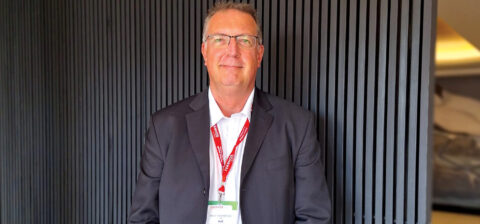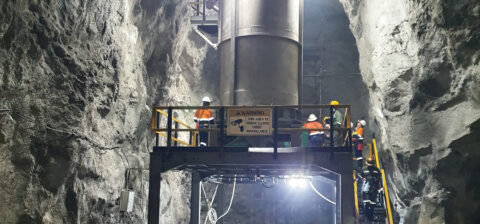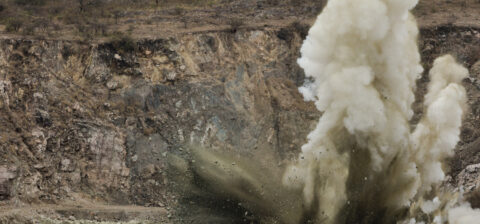SA Mining
Responsible Gold Mining
The World Gold Council, the market development organisation for the gold industry, recently launched the Exposure Draft of its Responsible Gold Mining Principles. SA Mining caught up with Terry Heymann, chief financial officer at the World Gold Council, to gain a further understanding of the principles.
What are the drivers for establishing principles for responsible gold mining?
The World Gold Council’s aim is that the Responsible Gold Mining Principles become a credible and widely recognised framework through which gold mining companies can provide confidence to investors, supply chain participants and consumers that their gold has been produced responsibly.
Environmental, social and governance (ESG) considerations are becoming increasingly important to gold consumers and investors. These buyers of gold are keen to understand more about the production process in order for them to have confidence that the gold they buy is responsibly mined and sourced.
At present there is no over-arching framework that sets out clear expectations for consumers, investors and the downstream gold supply chain as to what constitutes responsible gold mining. The Responsible Gold Mining Principles are designed to do just that.
Our members have demonstrated a sustained focus on improving their own performance with regards to ESG considerations and there is now increasing recognition of the need for collective engagement for the gold market.
How are the principles intended to influence both the sector and investors?
The principles are designed to set out high-level commitments around areas that are considered to be key regarding responsible gold mining.
They are designed to support and reinforce existing standards and codes but are focused solely on the gold mining sector.
As such, they are intended to be complementary to initiatives like the International Council of Mining and Metals (ICMM) Performance Expectations and the London Bullion Market Association’s (LBMA) Responsible Gold Guidance, which applies specifically to refiners.
Are there other sectors in the mining industry that have rolled out a similar initiative?
There are many existing standards and codes in practice, such as the ICMM’s Performance Expectations and the LBMA’s Responsible Gold Guidance.
However, there is no over-arching framework that sets out clear expectations to investors and downstream users as to what constitutes responsible gold.
Will OTHER SECTORS follow suit in inking a similar set of principles?
There are already a number of approaches in place across different supply chains; we anticipate that these will increase given the continued increased interest in responsible sourcing.
By when do you expect the final version to be launched?
The current consultation is open until 26 April. Once the consultation is completed, we will review all feedback from a variety of stakeholders which will then be implemented in the final version.
We hope to be in a position to finalise the Responsible Gold Mining Principles in H2-2019.
In considering the final drafting of the Responsible Gold Mining Principles, it is important to ensure that these are aligned with other responsible sourcing standards, in particular the LBMA’s Responsible Gold Guidance.
The timescale for the roll-out of the Responsible Gold Mining Principles will therefore be influenced by developments of other initiatives.
What kind of input has the industry and interested investors provided so far?
Over 150 organisations and individuals from across government, international organisations, investors, civil society, supply chain participants and gold mining companies participated in the first round of consultation, extensively inputting into the design of the principles.
We recognise the importance of an effective consultation process in ensuring credible but realistic outcomes.
For context, when we launched the Conflict-Free Gold Standard in 2012, several substantial changes were made as a result of the consultation undertaken at the time.
The Responsible Gold Mining Principles are no different. We have already included a number of substantial changes in the exposure draft.
Have there been any challenges to establishing this set of principles?
The main challenge in establishing this set of principles is in ensuring that the framework accurately addresses the key environmental, social and governance issues for the gold mining sector, as well as ensuring that our principles remain complementary to and aligned with other initiatives.
External assurance is a fundamental expectation for conformance with the Responsible Gold Mining Principles.
The World Gold Council has developed a draft external assurance framework for the principles.
The framework aims to be credible, pragmatic and aligned with other responsible sourcing initiatives.
Given that Africa is a significant gold mining destination, do you foresee any potential opportunities arising from the proposed Responsible Gold Mining Principles?
The World Gold Council’s aim is that the principles become a credible and widely recognised framework through which gold mining companies can provide confidence to investors, supply chain participants and consumers that their gold has been produced responsibly.
With many of our member operations based in Africa, we anticipate that the adoption of these principles will give increased confidence around the responsible mining practices followed.







 Sign-up and receive the Business Media MAGS newsletter OR SA Mining newsletter straight to your inbox.
Sign-up and receive the Business Media MAGS newsletter OR SA Mining newsletter straight to your inbox.